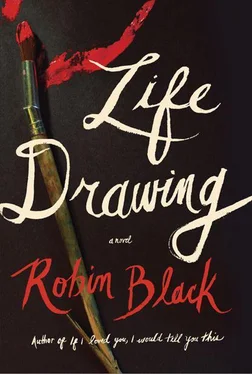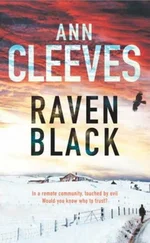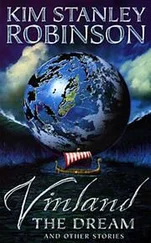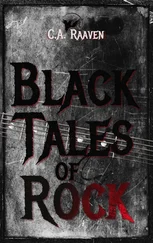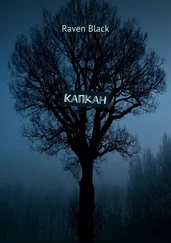The empty Sagamore Bridge, so strange with no other cars in sight, seemed to have been built for us alone. I half imagined that if I turned around, I would discover it had disappeared.
By the time we reached Wellfleet, I had gone through a dozen or more moods. Rage. Disbelief. More rage. But when we pulled up to his parents’ house I was gripped by a strange elation. After all, what had I really learned? That she was in love with him? I already knew that. That he was inspired by her? Arguably, I had known that too. That she had read his new work? Only that was real news and it did sting, but it did something else as well. Whether he’d meant to or not, Owen had finally given me a chance to be generous to him. Maybe even a little bit noble. And at a cost that felt bearable to me, used to Nora as I was. And so by the time we got out of the van, I felt almost exhilarated.
This was by no means my usual mood when faced with a few days of Lillian and Wolf. Often, they made me feel inconsequential, like a sapling unlikely to thrive. Both tall, both lean, they exuded an identical unflagging energy, as though all those months and years of work in sun-beaten deserts had forged them into super beings. What doesn’t kill you makes you stronger . The first time I met them the line had stuck in my head — as had the conviction that whatever had made them stronger would undoubtedly have killed me.
Wolf answered the door with a quiet greeting, Lillian calling out from the living room, just behind him. “Hello, hello, welcome … don’t take off your coats, because we’re headed right out.”
“Only if you don’t mind driving,” Wolf said. “Our car is in the shop.”
He hadn’t hugged either of us and neither did she as she emerged. That was one of their peculiarities. Not only the absence of physical affection — which I was used to in my own family — but the way they could greet us after ten months as though we’d just been over the night before.
“I’ll put on a coat,” Lillian said. “Though it’s never really cold anymore, which would be just fine with me if it didn’t signal the end of life on Earth.”
They were strikingly elegant still, in that way that has little to do with anything as impermanent as clothing or as vulgar as money but everything to do with bearing. She looked like Amelia Earhart might have had she lived long enough for her cropped hair to turn white, with permanently tanned yet barely lined skin, and those loose joints of her son’s, long limbs, easy motions. And even in his eighties Wolf too seemed like he’d be best suited standing beside some early-twentieth-century biplane, white scarf fluttering, blue sky beckoning — not to mention that his name was Wolf, which wasn’t short for anything, his official first (or Christian) name being Edward, but was a title, an honorarium, he had acquired in his youth for quests or conquests or hungers unknown by me. Fearless. Happy. They were adventurers. By nature and in fact, putting themselves in situations time and again throughout their lives in which terrible things might have happened and sometimes did — which meant they were quick to scoff at such irritations as our impatience with having to wait endlessly at every summertime traffic light on Route 6.
I handed Owen the keys. “Tag, you’re it,” I said. “I could use a few drinks.”
I asked if I could step in to use the bathroom and Lillian looked at me for a moment as though I had named an activity of which she was unaware, and then said, “Oh. Yes. Of course. We’ll all wait in the car.”
Years before, it had surprised me that they didn’t share our preference for the desolation of the Cape midwinter. I’d thought that having worked so much in empty spots, they would; but they were as sociable as Owen and I were not. They loved the six-month-long hubbub of summers up there, only tolerating the winter because they couldn’t afford two homes. Without the crowds and chatter, they worked on the seemingly ceaseless project of writing up all their adventures. Of that, they spoke little, but then, occasionally, a rather touching memoir piece would appear in a journal of archaeology and a copy would appear at our home — both their names listed as authors. And there were reams of typescript tucked into odd cabinets throughout their house, so though it wasn’t a topic of conversation it was a backdrop to every visit.
As were copies of Owen’s books — except the novel depicting Lillian as a young woman. At publication, her sole comment had been, “As fiction I’m surprisingly compelling,” a response that Owen took as a lavish compliment, given what she might have said. “It was an assumed risk,” he said. “The fact that she didn’t sue me for slander or royalties or inadequate filial affection is a landslide victory.”
The oddity of Owen’s ties to Lillian and Wolf — whom he too called Lillian and Wolf — had been a relief to me from the start. I’m not sure I could have married a man with the sort of mother I fantasized my own would have been, the nurturing, clucking sort, who would love me up — as Alison might say. But I rather enjoyed being the oddball daughter-in-law to a pair of distinctly non-parental characters who seemed to have wandered off the set of a Noël Coward play, brandy snifters in hand.
And they were good people, at heart. At our few early family gatherings, I feared that these university-affiliated archaeologists, authors of books and articles, shabbily elegant WASPs, might make my Jewish high school history teacher father feel somehow lesser. But there had never been a glimmer of that. Wolf had gone out of his way to express admiration for those who could translate what he called the mare’s nest of human civilization to youngsters. “There isn’t an archaeologist worth a damn,” he said, “who can’t still tell you about the history teacher who first made the past come alive.”
The only truly awkward moment we’d ever experienced was when we’d all gathered for a brunch for some occasion — maybe Owen’s fortieth birthday, a June event — and Lillian made a toast to my mother’s memory, then began to quiz my father on the ways each of his daughters did or didn’t remind him of her. He’d made a puzzled face as if to say it had never occurred to him to make any such connection at all; and it was Letty, a usually quiet presence, who’d saved the day with an abrupt subject change, asking us urgent, out-of-context questions about whether we had any travel plans for the summer.
After that, Owen must have clued them in, because it never happened again.
Since it was one of very few restaurants open that time of year, the dark basement bistro was more crowded than one might have guessed from the quiet street. Everyone there knew Lillian and Wolf, which meant endless introductions and appraisals of the degree to which Owen looked like one or the other or, as was genuinely the case, both.
Once all of that settled down we had what was really our first chance to talk, and Lillian asked immediately after my father. I gave her the basic report, nothing good to report, nothing imminent either. As I looked at her face, etched deep by experience, by keen interest in the world, I wondered if she might understand the new and better relationship I had with my father now that he was no longer himself but a strange, scrambled version of a man I barely knew, full of surprises, short on rules.
The drinks flowed and the meal won us over with its simple, fine quality. I found myself thinking that life was a pretty good thing, right then. And I enjoyed, too, surprising Owen with my good spirits. Look, I can be the bigger person also. I can let you have an adventure, let you explore something outside the close of us .
Читать дальше
